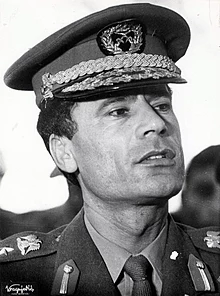Muammar Mohammed Abu Minyar al-Gaddafi[
- LYEPEI

- Aug 10, 2020
- 3 min read
Muammar Mohammed Abu Minyar al-Gaddafi[b] (c. 1942 – 20 October 2011), commonly known as Colonel Gaddafi, was a Libyan revolutionary, politician and political theorist. He governed Libya as Revolutionary Chairman of the Libyan Arab Republic from 1969 to 1977 and then as the "Brotherly Leader" of the Great Socialist People's Libyan Arab Jamahiriya from 1977 to 2011. He was initially ideologically committed to Arab nationalism and Arab socialism but later ruled according to his own Third International Theory.
Muammar Gaddafi معمر القذافي
Gaddafi in Belgrade, SR Serbia, SFR Yugoslavia, 1970
Brotherly Leader and Guide of the Revolution of LibyaIn office
1 September 1969 – 20 October 2011[a]President
See list
Prime Minister
See list
Preceded byPosition establishedSucceeded byMustafa Abdul Jalil (Chairman of the National Transitional Council)Chairman of the Revolutionary Command Council of LibyaIn office
1 September 1969 – 2 March 1977Prime MinisterMahmud Sulayman al-Maghribi
Abdul Ati al-ObeidiPreceded byIdris (King)Succeeded byHimself (Secretary General of the General People's Congress)Secretary General of the General People's CongressIn office
2 March 1977 – 2 March 1979Prime MinisterAbdul Ati al-ObeidiPreceded byHimself (Chairman of the Revolutionary Command Council)Succeeded byAbdul Ati al-ObeidiPrime Minister of LibyaIn office
16 January 1970 – 16 July 1972Preceded byMahmud Sulayman al-MaghribiSucceeded byAbdessalam JalloudChairperson of the African UnionIn office
2 February 2009 – 31 January 2010Preceded byJakaya KikweteSucceeded byBingu wa MutharikaPersonal detailsBorn
Muammar Muhammad Abu Minyar Gaddafi
c. 1942
Qasr Abu Hadi, Italian LibyaDied20 October 2011 (aged 69)
Sirte, LibyaCause of deathGunshot woundResting placeIn an unknown place in the Libyan DesertPolitical partyArab Socialist Union (1971–1977)
Independent (1977–2011)Spouse(s)
Fatiha al-Nuri ( m. 1969; div. 1970)
Safia el-Brasai ( m. 1970)
Children
Sons
Daughters
Benghazi Military University AcademyNet worthUS$200 billion (2011, est.)[5]ReligionSunni IslamSignatureMilitary serviceAllegianceKingdom of Libya
(1961–1969)
(1969–1977)
(1977–2011)Branch/serviceLibyan ArmyYears of service1961–2011RankColonelCommandsLibyan Armed ForcesBattles/wars1969 Libyan coup d'état
Born near Sirte, Italian Libya, to a poor Bedouin family, Gaddafi became an Arab nationalist while at school in Sabha, later enrolling in the Royal Military Academy, Benghazi. Within the military, he founded a revolutionary group which deposed the Western-backed Senussi monarchy of Idris in a 1969 coup. Having taken power, Gaddafi converted Libya into a republic governed by his Revolutionary Command Council. Ruling by decree, he deported Libya's Italian and Jewish population and ejected its Western military bases. Strengthening ties to Arab nationalist governments—particularly Gamal Abdel Nasser's Egypt—he unsuccessfully advocated pan-Arab political union. An Islamic modernist, he introduced sharia as the basis for the legal system and promoted "Islamic socialism". He nationalized the oil industry and used the increasing state revenues to bolster the military, fund foreign revolutionaries, and implement social programs emphasizing house-building, healthcare and education projects. In 1973, he initiated a "Popular Revolution" with the formation of Basic People's Congresses, presented as a system of direct democracy, but retained personal control over major decisions. He outlined his Third International Theory that year in The Green Book.
Gaddafi transformed Libya into a new socialist state called a Jamahiriya ("state of the masses") in 1977. He officially adopted a symbolic role in governance but remained head of both the military and the Revolutionary Committees responsible for policing and suppressing dissent. During the 1970s and 1980s, Libya's unsuccessful border conflicts with Egypt and Chad, support for foreign militants, and alleged responsibility for the Lockerbie bombing in Scotland left it increasingly isolated on the world stage. A particularly hostile relationship developed with the United States, United Kingdom, and Israel, resulting in the 1986 US bombing of Libya and United Nations–imposed economic sanctions. From 1999, Gaddafi shunned Arab socialism and encouraged economic privatization, rapprochement with Western nations, and pan-Africanism; he was Chairperson of the African Union from 2009 to 2010. Amid the 2011 Arab Spring, protests against widespread corruption and unemployment broke out in eastern Libya. The situation descended into civil war, in which NATO intervened militarily on the side of the anti-Gaddafist National Transitional Council (NTC). The government was overthrown, and Gaddafi retreated to Sirte, only to be captured and killed by NTC militants.
A highly divisive figure, Gaddafi dominated Libya's politics for four decades and was the subject of a pervasive cult of personality. He was decorated with various awards and praised for his anti-imperialist stance, support for Arab—and then African—unity, and for significant improvements that his government brought to the Libyan people's quality of life. Conversely, many Libyans strongly opposed his social and economic reforms, and he was posthumously accused of sexual abuse. He was condemned by many as a dictator whose authoritarian administration violated human rights and financed global terrorism.


Comments